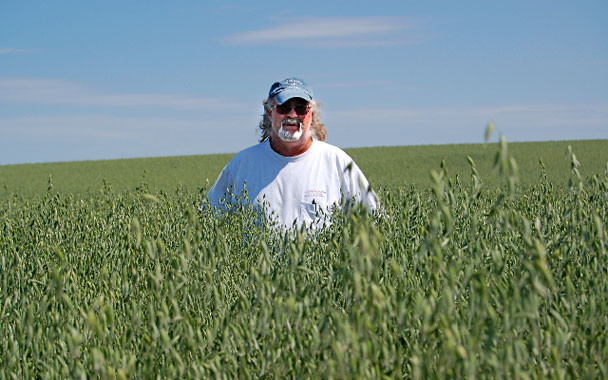Charlie Johnson, Lake County, South Dakota
It is asserted as if it is natural law: Organic farming is impossible on the Great Plains. It is an absolute truth embraced by huge industrial farmers who have spent half a century embracing the trinity of genetically modified seeds, chemical fertilizers and pesticides, and ever more powerful, ever more expensive, tractors and other equipment. It is embraced just as vigorously by small-acre organic farmers who cannot imagine that the complex details of soil and farm ecology required for organic farming can be managed on the huge scale of the Plains. So what are Charlie and Allan Johnson doing operating a 2,400-acre organic family farm in South Dakota? They’re making almost twice the profit on their crops that their conventional neighbors are making … that’s what.
“My father was a hippie, but he had a crew cut” Charlie says, to describe Bernie Johnson. “If 100 people came to a fork in the road, and 99 went in one direction, Bernie would go in the other. Dad used to say, ‘If I can’t put it on my tongue, I’m not going to put it on my crops.’” Bernie Johnson and his brother went totally organic in 1976. That was back when there was no premium for organic crops, when being organic was a cause. The family never looked back.
The Johnson family home is a neatly mowed compound of grain silos, chicken coops, a classic red barn, and a weathered white house. An American flag stands guard, and fields of soybeans, corn, and oats stretch to the horizon. When I arrive, Charlie’s wife Bette is shoulder deep in the drainage ditch beside the driveway, hand-cutting Canadian thistle weeds before they go to seed. “It’s hand-to-hand combat,” Charlie says, laughing. “Last week was the biggest week of cultivating [disking the soil for weed control] I’ve done in my life. I was in the tractor from eight A.M. to midnight. Six hundred acres in eight days.”
Like every South Dakota farmer east of the Missouri River, the Johnsons have been fighting Mother Nature since early June, when a massive storm dumped two and a half inches of rain on the land in a half hour. “We had too much rain, too fast, on too wet a ground. It gave the weeds a head start.” Conventional farmers can spray 1,000 acres in a few hours. But to keep their organic certification, the Johnsons must accomplish the same tasks without chemicals. Charlie is philosophical. “Mother Nature and God gave us 100 percent of what we have. If she needs to take back 10 percent for insects and floods, that’s okay.”




 Pinterest
Pinterest


